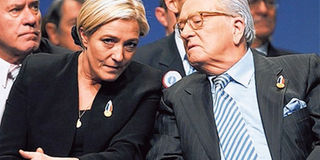French unity against far-right crumbles as National Front rises

National Front leader Marine Le Pen with her father, Jean-Marie Le Pen, who founded the French far-right party. PHOTO | FILE
What you need to know:
Fast-forward 13 years, and everything has changed.His daughter Marine, now leading the anti-Europe, anti-immigration party, and targeting the French presidency in 2017, topped the polls in the first round of regional elections on Sunday in a historic win.
When far-right National Front leader Jean-Marie Le Pen made it to the second round of the 2002 presidential election, shocked voters and mainstream parties united to keep him out of power.
Fast-forward 13 years, and everything has changed.
His daughter Marine, now leading the anti-Europe, anti-immigration party, and targeting the French presidency in 2017, topped the polls in the first round of regional elections on Sunday in a historic win.
This time, panicked Socialists and conservatives do not agree on how to react.
Even if they did, opinion polls show many of their voters do not want such alliances anymore.
“The old system died tonight,” Marine’s niece Marion Marechal-Le Pen proclaimed on Sunday after she won 40.5 per cent of the vote in southeast France.
She may well be right.
In 2002, hundreds of thousands took to the streets to say they didn’t want the far-right in power and Le Pen senior lost by a huge margin in the run-off after left-wing supporters voted for centre-right Jacques Chirac.
Ahead of this year’s regional elections run-offs on Dec. 13, there have been no signs of any such rallies being planned against the far-right party, which has been boosted by fears over the Islamic State attacks that killed 130 people in Paris last month, as well as by record unemployment and immigration
“There is no comparison with 2002,” said Viavoice pollsters’ chief Francois Miquet-Marty.
“The National Front (FN) does not scare people as much, Socialist voters are more reluctant to vote for Nicolas Sarkozy’s (conservative) party, and people are more willing to accept the idea of FN regions, it is not as repulsive to them as seeing Jean-Marie Le Pen become president,” Miquet-Marty said.
Faced with the prospect of the FN winning one or several regions on Dec. 13 and using them as a platform for the 2017 presidential elections, Socialist President Francois Hollande and his predecessor Sarkozy took diametrically opposite decisions. Both are proving divisive within their own camp.
Sticking to a decades-old tradition of mainstream French parties allying to keep the far-right out of power at all cost - dubbed the “Front Républicain” or “Democratic barricade” - the Socialists are pulling out of at least two regions and have called on their voters to back Sarkozy’s Republicans there.
But Sarkozy and most of his party’s top officials have rejected any such move, saying it is undemocratic and could well be counter-productive. Sarkozy first broke with that tradition four years ago and his party insists he won’t budge.
“We do not own the voices of our voters,” Sarkozy’s former foreign minister Alain Juppe said after the Republicans issued a statement ruling out alliances with the Socialists which they said “would give the French the feeling that we are confiscating the election by striking tactical deals behind their backs”.
The writer filed this article from Paris




